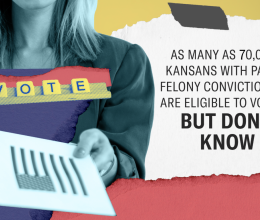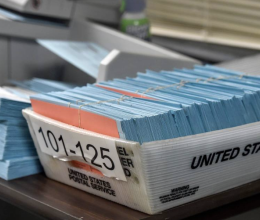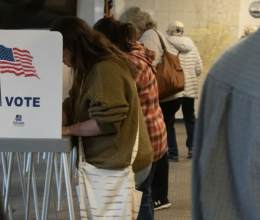
Voting Rights Restoration is About All of Us
Here at ACLU of Kansas, we’re embarking on a new project: to inform Kansans re-entering from incarceration of their voting rights.
In Kansas, if you’re convicted of a felony, you lose your voting rights while serving your sentence - this is called felony disenfranchisement. Your rights are only restored and you can register to vote after your sentence has been completed. This means that Kansas has a partial disenfranchisement system, in contrast to other states that have complete felony disenfranchisement, meaning that they permanently ban people with felonies from voting ever again.
Unfortunately, because of the varied policies across the country, many Kansans with past felony convictions may not realize their voting rights can ever be restored, even if the solution could be as simple as a brochure included in paperwork from the parole office. Informing people of their rights is an obligation for not only people who work in the criminal legal system, but also for all of us who are in community with or who are returning citizens ourselves.
This work isn’t just for Kansans who are system-impacted – it’s about all of us who care about the strength and inclusion of our democracy.
Felony disenfranchisement, and the lack of education about voting rights restoration after incarceration, is just one thread in a web of tactics that make it harder to vote. In Kansas, most people think politicians should be making it easier, not more difficult, to participate in our democracy. Yet in the 2023 state legislative session, lawmakers attempted to pass a number of laws that would make it harder to vote, including a bill that would have done away with the 3-day window to cast a mail-in ballot. In Wyandotte, Sedgwick, and Johnson County, voters who are more comfortable in languages other than English don’t have access to voting materials in additional languages. In Ellis County, despite the community and student advocates organizing for it for years, there’s no polling location on campus at Fort Hays State University, and in Shawnee County, we’re asking election officials to expand early voting locations – right now, Shawnee County only has one.
In all of these seemingly different issue areas, there’s one clear throughline – these barriers make it harder to vote for specific groups of people: people of color, young people, people with disabilities, and poor and working class people. This is not a coincidence.
In Kansas and across the country, laws were created to deny people with felonies of their voting rights after the Reconstruction era, as a backlash to a growing political voice: Black voters. By disenfranchising people who had been convicted of a crime, lawmakers could make it harder to vote for the people most impacted by the criminal legal system: people of color.
We see this legacy today in the felony disenfranchisement laws that remain, and the gap in voting rights restoration education – if people don’t know they have voting rights, how can they participate in our democracy? And if someone’s punishment is prolonged by constantly extended their probation or parole for noncriminal violations, is that also a way to prevent them from voting?
All voter suppression tactics – whether it’s closing a 3-day window for mailing back your ballot, ignoring the wishes of young voters for a campus polling location, failing to provide materials in Spanish and other languages, or denying the right to vote to people with felonies – have always been about silencing some voices in order for others to maintain power and shirk accountability.
Our access to the ballot box is crucial to ensure that those who have decision-making power over policies directly impacting our families and communities should have to hear from us – and that means all of us.
Related content


Kansas to eliminate 3-day grace period for mail-in ballots after...
March 26, 2025ACLU of Kansas reacts to state legislature’s attack on right to vote
March 25, 2025ACLU of Kansas reacts to state legislature’s attempt to rewrite...
March 19, 2025
As lawmakers scheme to pass a destructive voting bill, let’s...
March 13, 2025“A blatant power grab” – ACLU of Kansas warns of Kobach-fueled...
February 10, 2025Kansas Senate rushes through elimination of mail processing period
February 4, 2025
HB 2091: Voter Registration Bill
January 31, 2025